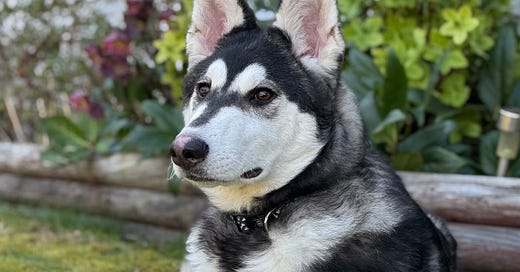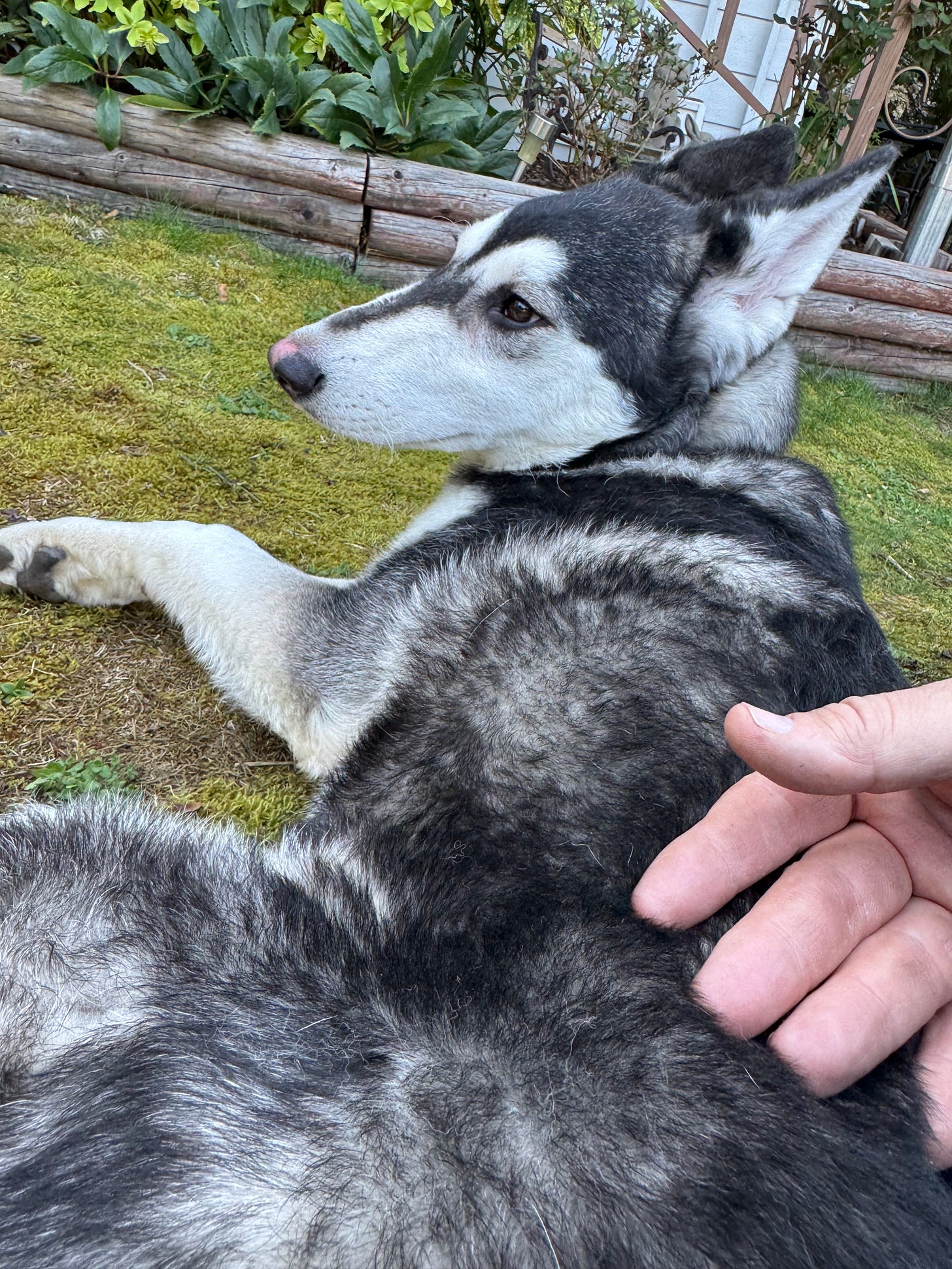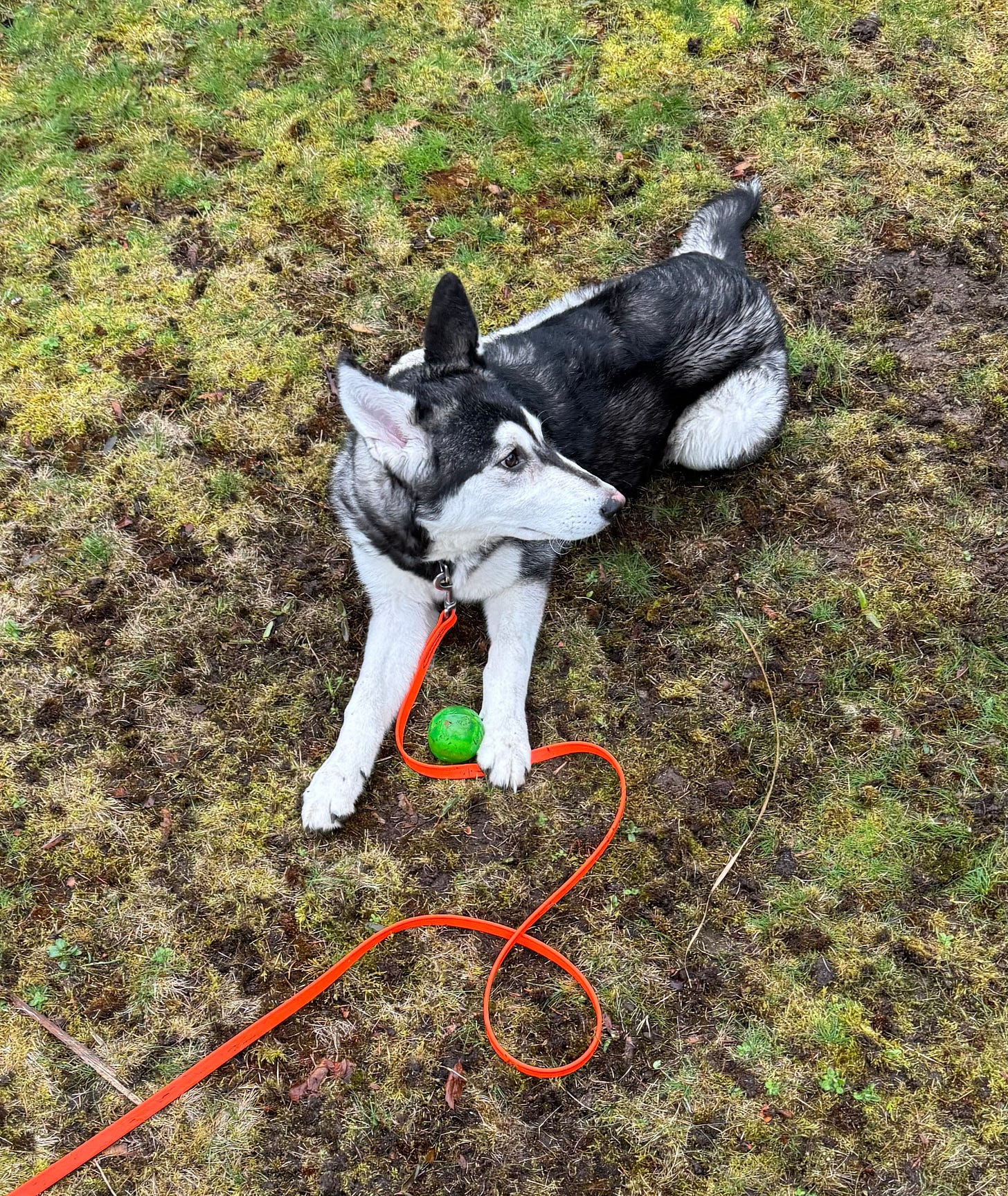Earning a dog’s trust.
This weekend, I met a sweet Husky puppy. I named him Harrison because he was found near Harrison Creek in Kent. He had been hanging out for four days at a particular trailer in a trailer park, next to a ravine. He is a beautiful, kind dog. For the first four days he was there, he was reluctant to have anyone pet him. He was especially jumpy about people touching his collar. I later learned that someone had grabbed his collar to try to get him under control, and he had struggled away.
I brought a humane trap, which I thought would work right away, but he was too cautious of it. I spent 4 hours with him on Saturday, earning his trust. I demonstrated that I wasn’t going to grab for his collar, and I would let him set the timetable, I would let him tell me when he was ready for more help from me. After a couple of hours, I was able to pet him all over, and he was quite friendly towards me. Because he had a collar, I could have just attached a leash to it, and he would be secure. He was telling me he didn’t want that. I gave the trap more time to work. Sometimes it can take dogs several days to go in a trap. I tied the trap open, so it wouldn’t automatically close if a dog went in, then I brought Tino over and let him go in the trap so Harrison could see that everything was okay and nothing bad would happen. After I replenished the bait and reset the door to close, Harrison still wouldn’t go in. When I was sitting in my car down the street, I was looking at my phone, and I didn’t see the neighbor across the street when she brought a bowl of food over for the dog. She gave him two cans of food and some dry food in a large bowl. When the owner of the unit where Harrison was hanging out asked why she had given him the food, she said, “Because he didn’t like the sausage in the trap.” Because of this intentional sabotage of my efforts, I knew that getting him in the trap that evening was very unlikely. I decided to leave the trap overnight so he could get used to it.
I came back today and spent a couple of hours with him. I left Tino at home so that I could try luring Harrison into the car, to see if he would like that any better. He did not. Next, I tried a squeaky ball. Harrison didn’t seem to know what it was at first, but then he really responded to it. He rolled on it. He would grab it in his teeth and fling it around and then he would pounce on it. He got the zoomies, chasing the ball around the yard. He rolled upside down and contemplated his new ball from a different angle. Because I helped him play with the ball and encouraged him, it seemed to strengthen our bond. Every interaction with him had been positive, and I had been letting him tell me what he was comfortable with.
I drove away, to see if he would go in the trap if I was not around. I circled around the block and watched from a distance. He showed little interest in the trap even though he was obviously hungry and he was thinking about the sausage in there. I saw the neighbor across the street come out with more food for Harrison, even though she could see I had the trap baited with sausage. Although she was being kind, in her way, this would have interfered with the attempts to get him in the trap, and also with my bonding with him. It is very common for people to assume they know better than I do, how to help a dog. In fact, it’s almost universal. Even though I have caught and helped thousands of dogs, I can’t remember a case when someone didn’t give me advice on what I should do, or tell me how they would do things differently. Quite often, the advice they give me is something they just thought up, something they have never seen attempted before, but it’s got to be better than the tried and true methods I have been using for years, they think. Because it was only a matter of time before someone tried to grab him again, possibly scaring him out of his comfort zone, I felt like I needed to push him faster than I would normally like to. I wanted him to tell me what was okay, and he told me, through his body language and actions, that he wanted to keep taking things slow. To rush things felt like a betrayal of the bargain I had made with him.
I put the leash on his collar, while I was petting him. He was clearly uncomfortable with this. He squirmed and cried, but I was able to calm him down. It seemed he had had some sort of negative experience with a leash. I walked him up and down the street to try to build more confidence. He did okay with that. When I led him to the car, he did not want to go in. I found that I could simply scoop him up in my arms, and he was okay with that. I sat in the car with Harrison in my lap. He was anxious but not panicking. He explored the car, looking for a way out, but then he came back to me and stayed close to me, touching me.
When I got to the shelter, they were closed. I thought I had seen in an internet search that they were open. Because they were closed, I drove around the back of the building to put him in the overnight kennel, meant for dogs brought in after hours. Someone saw me back there and recognized me from the many times I have brought dogs into the shelter. They said I could bring him to the lobby so he could be booked in properly, and then placed in an indoor kennel overnight. He didn’t want to go, so I scooped him up and carried him. He seemed happy to have me carry him everywhere for the rest of his life. Once he was checked in and vaccinated, one of the kennel staff started to take him back to his new temporary home, but he wouldn’t go. I offered to carry him back, but she said she would carry him. She scooped him up. He looked a little worried, but accepting.
I worry about Harrison being in the shelter. Our local shelter does a great job in the face of overwhelming demand. I believe there were six other Huskies in the shelter, besides all the other dogs. It is called a shelter for a reason, and dogs are definitely safer in the shelter than on the streets, in most cases. I had asked online for a foster home for Harrison, but no one had responded. I know the shelter staff will do the best they can for Harrison. I don’t think he is going to be happy there. He was happy at the trailer in the corner of the trailer park, free to run around, even though that’s not safe. He was very happy having me play with the squeaky ball with him. I wish he could have that life, just hanging out on the porch of a nice man, getting fed, having people play with him and bring him treats. Even though he didn’t like going to the shelter, I took him there because it was best for him. Dogs on the streets tend to get hit by cars eventually, which I know because I have picked up dozens of bodies over the years. He is a wonderful dog. I don’t know why his owners aren’t looking for him. Maybe they have fallen on hard times. I really hope Harrison can find a good family that will love him as much as he deserves. Of course, i would love to have taken him home and kept him forever, but I can’t adopt all of the hundreds of dogs that I rescue.
I was able to rescue Harrison because I earned his trust. I hope the shelter system works as it is intended, and Harrison finds a great home where they will love him forever. (I suppose I also hope that the family that lost a five month old puppy and appears to be doing nothing to find him was really just away on a trip, unaware he had escaped, and will go to the shelter looking for him. I can’t help feeling that no one is looking for this great, sweet puppy.) Although I know the shelter staff will do everything they can to place Harrison in a great home, I also know that dogs who don’t do well at the shelter can have a harder time finding that perfect home. I hope I haven’t betrayed Harrison’s trust.
If you are able to foster or adopt Harrison from the Kent shelter, please let me know. I really enjoyed spending time with him, and I know he can be a great dog for the family that is willing to take the time to earn his trust. I think that could be harder now, after I earned his trust, seeming to promise that I would always be his friend. I wouldn’t blame him if he feels like I abandoned him at the shelter. How is a dog supposed to know who he can rely on? I hope there is someone out there that can help Harrison learn that some people are good, and he can trust someone.







He was adopted!
James,
As always, Thank you. If you see Harrison again. He will remember you and he will remember you are a safe person. You know, because you are the one that taught me. If he is on the run again. He may not remember you right away. But when he does. It will be amazing. The time you took with Harrison giving him the chance to decide when things were ok. Shows your dedication. Because I have paid attention watching you work and studying all your posts and Newsletter articles. It takes me awhile sometimes to remember I need to walk away after a while when a dog cannot seem to accept me. Then I get so surprised when my second attempt sometimes they take only minutes before they let me pet them. Some of us do pay attention and try to remember the things you have shared. No matter how hard it is when someone thinks their way is better. To not say anything to them and just do what experience tells us works. Hoping they do not interrupt the process. Is usually the best thing. Defusing the situation instead of trying to tell them they are wrong is usually best.
A lot of people think they know a lot. As an example, When I show up on a medical call with some of my fellow Volunteers. People think they should tell us what we should be doing. Which I don't know what they know. But I do know we have protocols that we must follow. So, we do what we know is required. And use a few tactics to distract the unwanted advisors. But we have the luxury of not having to be on scene more than 20 minuets most of the time. So politely ignoring them works best. Most of the time.
Thank you for your continued effort to save every dog and cat you possibly can.